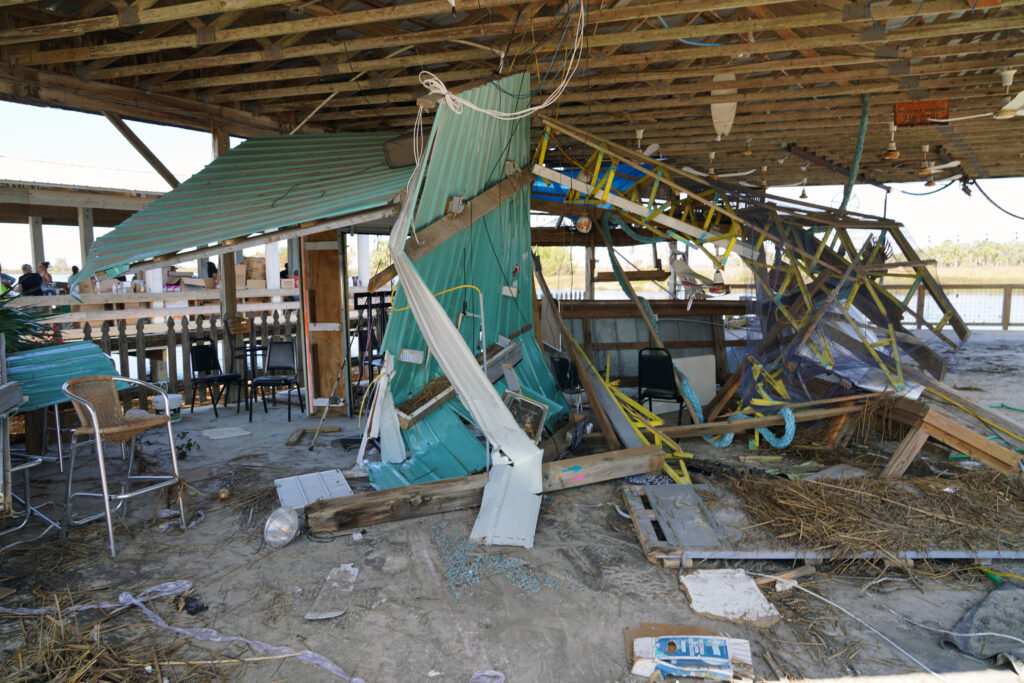By Mary Anna Mancuso, RepublicEn.org
The impacts of climate change are being felt beyond warming weather and increased storm severity; it’s now affecting the foundation of our electoral process.
In Florida, the intersection of severe weather and elections is becoming increasingly evident. As hurricanes become more frequent and intense, the ability to vote has individuals facing new hurdles as they and their polling locations are being displaced by rising tides and other dire impacts.
As we head into the final stretch of the 2024 election cycle, early voting in Florida is underway. Simultaneously, a portion of the state is still grappling with the cleanup from both hurricanes Helene and Milton — no small feat in harder-hit areas. These storms struck in the span of two weeks, which displaced residents, damaged polling locations and created logistical challenges for election officials.

In order to help, Gov. Ron DeSantis signed an executive order allowing “county election supervisors to relocate polling places or designate new ballot collection locations after the normal deadline and to accept voters’ requests to send mail ballots somewhere other than the home address they had on file.” These new provisions are a necessary adaptation to help Floridians participate civically, but they also underscore a troubling reality of how climate change is shaping how our elections are conducted.
This isn’t the first time Florida has had to adjust their voting plans. Ahead of the 2022 midterm elections, Hurricane Ian barreled through parts of Florida a week before early voting was set to begin. In counties that are home to about 12% of voters, the storm damaged polling locations and other infrastructure needed to carry out the election.
We cannot afford to ignore the impact that climate change can have on our election process. Rising sea levels, intense storms and flooding are more than just insurance claims waiting to be filed. When polling locations are destroyed, mailboxes are upended and communities are displaced, the right to vote is at risk.
Likewise, our neighbors in Georgia and North Carolina are still sorting through their own hurricane aftermath. Billion-dollar catastrophes are becoming part of a larger trend; wildfires, severe storms and flooding are happening regularly, averaging every two to three weeks, up from two to three months. As such, it is imperative to create more resilient election infrastructure such as offering greater flexibility in being able to register to vote and cast a ballot.
Throughout the 2024 presidential election, climate change has largely remained in the background as other issues took center stage, even as Americans have sweltered from the Northern Hemisphere’s hottest summer on record (and Floridians evacuated or sheltered in place to brace for the next hurricane). I get it – climate change is not sexy. Nor is it worthy of cat or couch memes. However, for a country that has prided itself on a 200-plus year experiment in democracy, it’s an important topic, especially as the world is heating up.
For Florida, climate change is not a nebulous concept. It is a present-day reality in which 22 million Floridians are faced with every day, and there are consequences to ignoring our changing climate, specifically when it comes to the democratic process.

The right to vote should not be compromised by extreme weather or lack of preparedness. There is an opportunity to take steps now to create more resilient election infrastructure, such as offering greater flexibility in being able to register to vote and cast a ballot.
Otherwise, we run the risk of disenfranchising entire communities as climate change worsens. After all, Florida is a microcosm of the challenges that election officials and state and local governments face when having to simultaneously clean up from a natural disaster and execute a safe and secure election for its voters.
The right to vote is fundamental to democracy and must be safeguarded, specifically in the aftermath of natural disasters. In Florida and beyond, preparedness for these events is critical to ensuring our elections remain accessible.
The strength in our democracy lies in its ability to adapt and election officials must prioritize to ensure every citizen can vote, regardless of the weather.
Mary Anna Mancuso is a political strategist and a spokesperson for RepublicEn.org, a growing group of conservatives who care about climate change. Banner photo: U.S. Airmen assigned to the Florida Air National Guard clear roads in Keaton Beach after the landfall of Hurricane Helene on Sept. 27 (Staff Sgt. Jacob Hancock/The National Guard, CC BY 2.0, via flickr).
If you are interested in submitting an opinion piece to The Invading Sea, email Editor Nathan Crabbe at ncrabbe@fau.edu. Sign up for The Invading Sea newsletter by visiting here.



